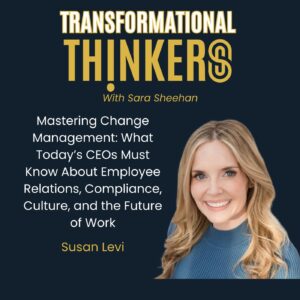Sara Sheehan welcomes Psychological Health and Safety Advisor, and expert in hope, Lindsay Recknell to the show to talk about the vital topic of mental health training for corporate spaces. Mental health is absolutely fundamental to corporate wellness and Lindsay offers several methods of training corporations, employees, and business owners how to speak the language of mental health in their workspace.
Lindsay became a certified Psychological Health and Safety Advisor after a personal burnout and period of complete overwhelm. She realized that not every leader has the mental health skills necessary to tackle such conversations after the responses she received to her own crisis. She is on a mission to educate leaders on how to do the mental health and support work necessary for healthy employees and workspaces.
In this episode, Sara Sheehan learns about the corporate mental health training that Lindsay Recknell offers through her company, Paradigm Corporate Wellness. Lindsay explains not only her Mental Health Skill Training Certificate Program and her Language of Mental Health Digital Subscription, but details for Sara exactly who will benefit from this training and what the return on investment will be. Lindsay is an expert in hope and her desire to make a positive impact on the lives of others, to make mental health a priority in workplaces, and to support wellness in organizations is deep-rooted and informed by education and empathy.
About Lindsay Recknell
As an expert in hope and a Certified Psychological Health and Safety Advisor, Lindsay works with individuals and organizations to increase their levels of psychological health & safety in the workplace using Positive Psychology and the Science of Hope. She empowers individuals, strengthens teams and transforms organizations through her Mental Health Skills Training certificate program, Language of Mental Health digital subscription and wellness webinars. Lindsay lives in Calgary, Canada with her husband and their two Golden Retrievers.
Resources discussed in this episode:
—
Contact Sara Sheehan | Sara Sheehan Consulting:
Hosted by Simplecast, an AdsWizz company. See pcm.adswizz.com for information about our collection and use of personal data for advertising.


